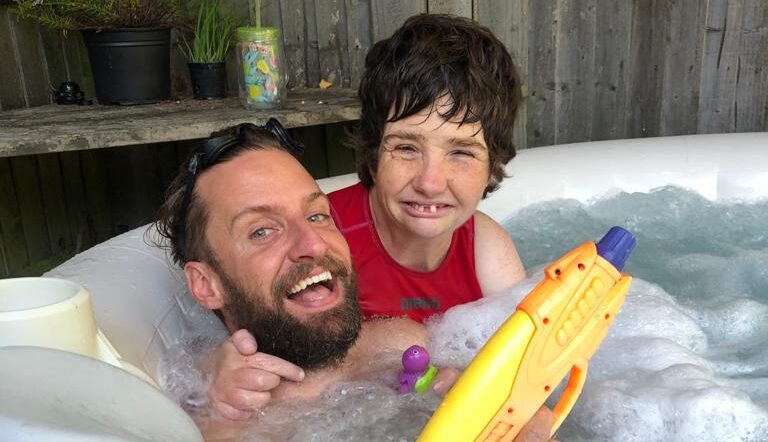
Will things change after lockdown? A family’s perspective
Coming out of lockdown, Malachy's parents believe that society will still be inaccessible for families with children or adults with a severe learning disability.

The family of Claire Steeples, 43, tell her story, where determination and the use of a personal budget to buy care, have transformed Claire's life.
“Girls just want to have fun” is Claire Steeples’ signature tune. A glance round her neat little bungalow, which is adjacent to her parents’ home, explains why. The living room walls are decorated with colourful drawings, Claire’s craft work and strings of photos of her doing things she enjoys such as sailing, swimming, dancing and being with family and friends.
Claire’s is no ordinary life – it’s an extraordinary one of challenge and triumph, where the love, dedication and determination of her family, and the use of a personal budget to buy her care, have transformed her life.
Claire, 43, has a severe learning disability with complex needs and communication problems. When she was six years old her parents John and Jenny were advised by John’s employer the Diplomatic Service that the family would not be sent on another posting abroad unless Claire was put into residential care, it was a difficult decision for the couple to make:
“You have everything to lose,” said Jenny, a retired nurse. “No parent wants to put their child into residential care. You lose your little person; they’re no longer part of the family.” A Paediatrician also advised the couple that Claire would always need lots of support and that residential care would give her the best support in life. Jenny said: “What he didn’t tell us was that when things go wrong with residential care, it is the family who are left to pick up the pieces!”
Claire’s first placement, at a school in Cornwall, was arranged by the Inner London Education Authority and Lambeth Council as the family’s UK home at the time was in London. Claire eventually moved to an adult placement, a small residential home. However, Jenny feels the differing needs of the four residents Claire lived with for 10 years, meant that staff did not have time or training to give Claire the individual attention she felt she needed.
“Management said they couldn’t cope with these real concerns and Claire was given 28 days notice to find alternative accommodation,” said Jenny. Jenny is adamant that the lack of stimulation and communication support was behind Claire’s behaviour issues.
“Claire was unable to communicate her needs and was becoming frustrated,” she said. “We had felt for some time that Claire was doing nothing and going nowhere.”
At the time Lambeth Council was piloting a self-directed support payment system entitled ‘In Control’ which enabled service users to take charge of their personal care budget and choose care packages right for them. Jenny and John decided to give it a try. That was a turning point for Claire.
The family set up a Trust – the Claire Patricia Steeples Trust (CPST) – to manage Claire’s budget. The budget is now funded by Hampshire County Council following the family’s move from London. The personal budget has led to major changes in Claire’s care package which has proved hugely beneficial to Claire in terms of her health and wellbeing and to her family who feel Claire is receiving care and support that meet her changing needs. Her brother Richard, an IT and Media Consultant, designed and manages Claire’s website www.cpstrust.co.uk. He also set up technology in her home that she uses daily.
The activities which Claire’s personal budget purchases are varied, well-costed and give value for money to ensure she is out and about in the community every day. This has improved her health and wellbeing and importantly is aiding her communication development, enabling her to learn to follow simple instructions and practice communicating her needs to others.
A quick look at her schedule shows what a packed programme it is. She regularly takes part in sailing, swimming at a nearby hotel leisure centre, craft workshops at The Point in Eastleigh, basketball sessions at Wyvern College in Fair Oak led by former Harlem Globetrotter Alan Cunningham and off-road adrenaline-rushing buggy activities at Marwell Activity Centre.
Much of Claire’s packed programme has been developed by her brother Robert who has a QCF level 5 in Management and is a PROACT SCIP Instructor, a Positive Behaviour Support programme which uses support strategies to avoid potential crisis situations and the need for physical interventions. He is an ‘Expert by Experience’, family carer for the Care Quality Commission, and previously for the CBF, providing valuable input for professionals on communication and behaviour support for people with learning disabilities.
Robert, and indeed the whole family, believe in the importance of total communication, a system which uses all the senses. Claire understands Makaton sign lanuage and at age 34 she learnt Picture Exchange Communication System (PECS). She uses pictures to represent her feelings and needs and express her choices regarding activities that she wants to do. One of her most frequent pictures she chooses is the one indicating that she wants to see her friends and she now has many friends.
“Because Claire had spent 23 years in residential care we didn’t really know what she was capable of doing at first but we remained positive” said Jenny. “That doesn’t mean life has been easy. It has been hard work with many challenges on the way. But having charge of a flexible budget and arranging Claire’s care, including a range of activities, has meant we have got to know the real Claire. It has brought independence for Claire and sense that she is a ‘free spirit’.
“We’ve taken family holidays and been able to get communication support. We’ve also learned to make things happen for Claire as soon as possible. We look at what Claire can do, not what she can’t do. It has meant she can avoid the labels other people would have put on her. She is more confident; she can communicate and she looks forward to events in a way that was not possible before.”
Jenny is adamant that in the long run personal budgets are not only good for the person accessing services via them because they offer choice and control over care, but that they can also avoid the need for costly health services. As a result of the physical activities Claire takes part in her general health, fitness and mobility have all improved and with medical support she has been able to come off some of the medications she was on.
“Everyone working together has proved that the willingness to think differently and creatively has resulted in positive outcomes for Claire,” said Jenny.
This article has been adapted from an article originally written by Hampshire County Council (HCC). Thanks to HCC and Jenny Steeples for permission to adapt and publish the article.
Read ‘The power of communication’ about Claire’s use of communication technologies

Coming out of lockdown, Malachy's parents believe that society will still be inaccessible for families with children or adults with a severe learning disability.

Laura has a severe learning disability. She has a great happy life but her mother's greatest concern for Laura is her Pica behaviour.